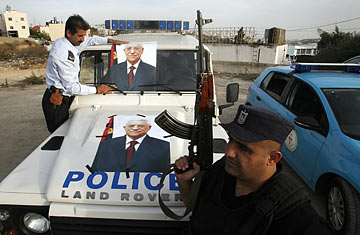
A Palestinian policeman attaches a picture of President Mahmoud Abbas to a police car during a parade in the West Bank town of Hebron
Palestinian Authority President Mahmoud Abbas' decision not to stand for re-election in January casts a pall over U.S. hopes to broker a two-state peace agreement with Israel. But it could also have dire consequences for the security situation in the West Bank. That's because Abbas' possible resignation threatens the future of the U.S.-funded Palestinian security forces that have begun to play a key role in preventing militants from launching attacks on Israel.
The 2,000-man Palestinian National Security Force overseen by U.S. Lieut. General Keith Dayton is the key to any peace agreement, according to American diplomats and Israeli defense officials. In its two years of existence, the security force, derisively termed "Dayton's men" by the Palestinians, has managed to soothe Israeli fears that it could be used as a resistance army against Israel and has impressed the Israelis with its willingness to enforce calm on the West Bank. But Dayton and others have warned that the force derives its motivation — and its ability to withstand charges by fellow Palestinians that it is doing Israel's work — from the belief that is the security nucleus of an emerging Palestinian state. Absent the prospect of imminent statehood, the men trained by Dayton may lack an incentive to police the West Bank.
Speaking at a pro-Israel think tank in Washington last May, Dayton had warned that the discipline of his troops could fall apart if there was no headway in peace talks. "With big expectations, come big risks," Dayton said. "There is perhaps a two-year shelf life on being told that you're creating a state, when you're not."
The crisis for the Palestinian security forces could come a lot sooner than Dayton's two-year deadline if Abbas steps down. Abbas is threatening to walk because he says Israel is not serious about achieving a two-state solution, citing as Exhibit A its refusal to halt all settlement construction in the West Bank and East Jerusalem. But his departure could cause the collapse of the Palestinian Authority. As chief Palestinian peace negotiator Saeb Erekat explained, Abbas "sees no state coming ... so he really doesn't think there is a need to be President or have an Authority. This is not about who is going to replace him. This is about leaving our posts."
The collapse of the Palestinian Authority could spell the end of Dayton's painstaking efforts to create a security force that can enforce law in the West Bank and stop militants from launching attacks on Israel and its settlers. Many Palestinians view the security force as collaborators carrying out Israel's bidding, and a crisis in morale could result if Abbas and the Palestinian Authority leadership signal that no Palestinian state is in the offing.
As a senior Israeli military officer told TIME, "We're checking the pulse of the situation every day." This officer, who asked to remain anonymous, says that if the Palestinian security force disintegrates, the Israeli army has prepared a series of responses, ranging from arrests, restoring some of the roadblocks and checkpoints (which Israel had removed reluctantly under U.S. pressure) and increasing the tempo of its operations inside the West Bank's towns and villages.
The creation of Dayton's security force has been one of the few success stories in recent U.S. efforts to resolve the Israeli-Palestinian conflict. Trained in Jordan, and equipped by Egypt with U.S. funding — by 2011, the U.S. will have spent $260 million — the battalions were deployed in Jenin, Nablus and Hebron. They cleaned out the armed gangs, caught drug traffickers and mediated between feuding Palestinian clans. With less crime and traffic eased slightly by fewer Israeli roadblocks, economic growth has risen 7% this year in the West Bank.
Last May in Qalqilya, the security force hunted down and killed a top Hamas operative. In the ensuing gunfight, three policemen were also shot dead, but the incident showed the Israelis that the security troops were willing to go toe to toe with Hamas. "We're quite satisfied", says the Israeli officer who acts as a liaison with Dayton and the Palestinians. Still, there are limits to how far the Israelis are willing to trust the fledgling Palestinian force. "We see progress, but we won't give them full control of the cities. They're not capable of fighting Hamas and Islamic Jihad."
It helps that, for now, at least, the Israelis and Abbas' forces share a common goal: getting rid of Hamas' cells in the West Bank. But that could change swiftly, as the Israelis are well aware. Abbas' talk of stepping down may just be a way of bluffing the Israelis and the White House to heed Palestinian demands. (Palestinian elections that Abbas had called for January are likely to be postponed after the Palestinian Authority leader was told by his electoral commission that Hamas would prevent voting in Gaza and the Israelis would likely do the same in East Jerusalem, meaning that Abbas' decision not to run for re-election doesn't have any immediate effect.)
But the impasse over peace negotiations is causing resentment in the West Bank to boil over. Some Palestinians are predicting an outbreak of protests early next year, and if so, Abbas' Fatah party may decide that the best way to regain its legitimacy with the Palestinian voters and win back support lost to Hamas will be to condone open resistance against the Israelis. If that happens, it's unlikely that Dayton's men will be able — or even willing — to stop an outbreak of anti-Israeli violence in the West Bank.
— With reporting by Jamil Hamad in Bethlehem and Aaron J. Klein in Tel Aviv
